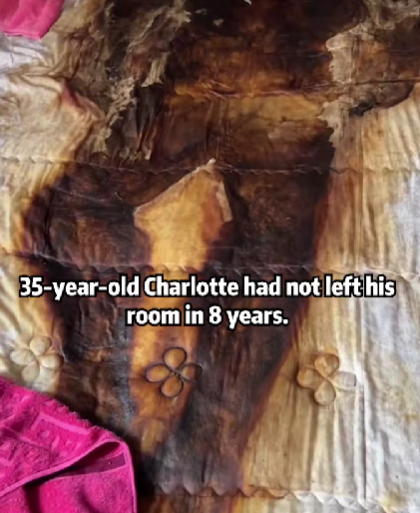When authorities finally entered the small apartment in Charlotte, North Carolina, they could hardly believe what they found. A 35-year-old woman named Charlotte had reportedly not stepped outside her room for eight years, living in complete isolation that left even the most experienced responders shaken.
The discovery came after neighbors alerted social services about a strong odor and strange noises coming from the apartment. When officers and medical staff arrived, they had to force their way inside — only to uncover a heartbreaking scene that revealed years of neglect, mental illness, and silent suffering.
Charlotte, once described by relatives as “bright and full of energy,” had withdrawn from the world following a series of traumatic events. Family members said she struggled with severe depression and anxiety, which worsened after losing both parents within a short period. Over time, she became too afraid to go outside, even for basic needs.
Authorities say she lived in her room for nearly a decade, depending entirely on deliveries and minimal outside help. Neighbors occasionally spotted food boxes left at her door, but no one had seen her face in years. “It’s like she vanished inside her own home,” one neighbor told reporters.
The most disturbing part of the discovery was the condition of the room itself. Photos from the scene showed a decayed mattress, damaged flooring, and walls stained from years of neglect. Investigators believe Charlotte spent nearly all her time in bed, surrounded by clutter and debris.
Medical teams immediately transported her to a nearby hospital, where doctors treated her for severe malnutrition, dehydration, and skin infections. “She’s lucky to be alive,” one paramedic said. “Eight years in that kind of environment takes a huge toll on the body and mind.”
Mental health professionals have since stepped in to evaluate Charlotte’s condition, emphasizing that her case highlights a growing crisis of untreated isolation and mental illness. “This isn’t just a story about neglect — it’s about someone who fell through every crack in the system,” said psychiatrist Dr. Emily Torres. “When depression becomes this deep, it consumes a person completely.”
Online, the story has sparked emotional reactions from thousands of people, many expressing sympathy and outrage that such a situation could go unnoticed for so long. Advocates are now calling for stronger community mental-health monitoring and wellness checks, especially for individuals living alone with known psychological conditions.
As of now, Charlotte remains under medical supervision and is reportedly responding to treatment. Social workers say her recovery will take years, both physically and emotionally, but they hope she can someday reintegrate into society.
Her story serves as a grim reminder that mental illness can be invisible until it becomes a tragedy. “No one should have to live — or suffer — in silence for that long,” Dr. Torres added. “Charlotte’s case shows us what happens when we stop checking in, stop listening, and stop caring.”
What began as a welfare check has become a national conversation — about compassion, awareness, and how many other “Charlottes” might still be out there, waiting for someone to notice.
